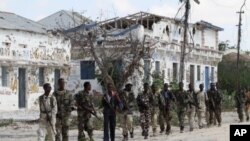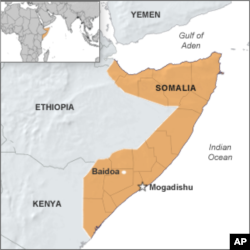Regional military forces battling al-Shabab militants in Somalia are leaving behind political vacuums in liberated regions. The Transitional Federal Government (TFG) and foreign powers say they want local administrations to set up in these areas, but it is hard to determine which of these will be reliable and trustworthy.
The international community is following closely the events unfolding in central and southern Somalia, as al-Shabab loses more ground to forces from the Somali government and the African Union mission, known as AMISOM.
Foreign governments invested in Somalia's political stability say it is important to see the quick establishment of local authorities in areas liberated from al-Shabab.
The U.S. government is one of the major parties supporting the political process in Somalia. U.S. policy is to give strong support to the federal government, while also expanding engagement with local authorities.
The U.S. special representative for Somalia, James Swan, says the U.S. is listening to the concerns of community representatives in newly-liberated to try to understand the situation better.
“The situation in all these newly-captured areas, we think there has to be a strong linkage between both a bottom up approach in which the community itself selects leaders in which that community and whom that community has confidence as their representatives, and as people who can help advance the interests of that community,” said Swan.
But there is fear within these areas that some individuals will hijack the process of establishing local authority and administrations for their own purposes.
Captain Adan Nur Adan, a member of parliament from Baidoa, says the timing may have been politically motivated to give Ethiopia a larger role in the talks.
“Why did Ethiopian troops move 24 hours before London conference? Why didn’t they liberate Bakool which is very close to the Ethiopian boundaries before Baidoa itself? If you want to liberate an area, you need to have plan for that area, especially what you do after you liberate," Adan said. "There is no plan still from the TFG and the Ethiopians.”
Adan says a new administration could gain support of the community if AMISOM forces move in fast and establish peace. But already, rival factions are wrangling for control of Baidoa.
Sources told VOA one group is led by Abdifatah Gessey, who was appointed by the Somali parliament speaker in 2009.
They say the other group is led by Mohamed Ibrahim, nicknamed Habsade, or “the collector,” who takes credit for liberating the town during the civil war in the 1990s.





